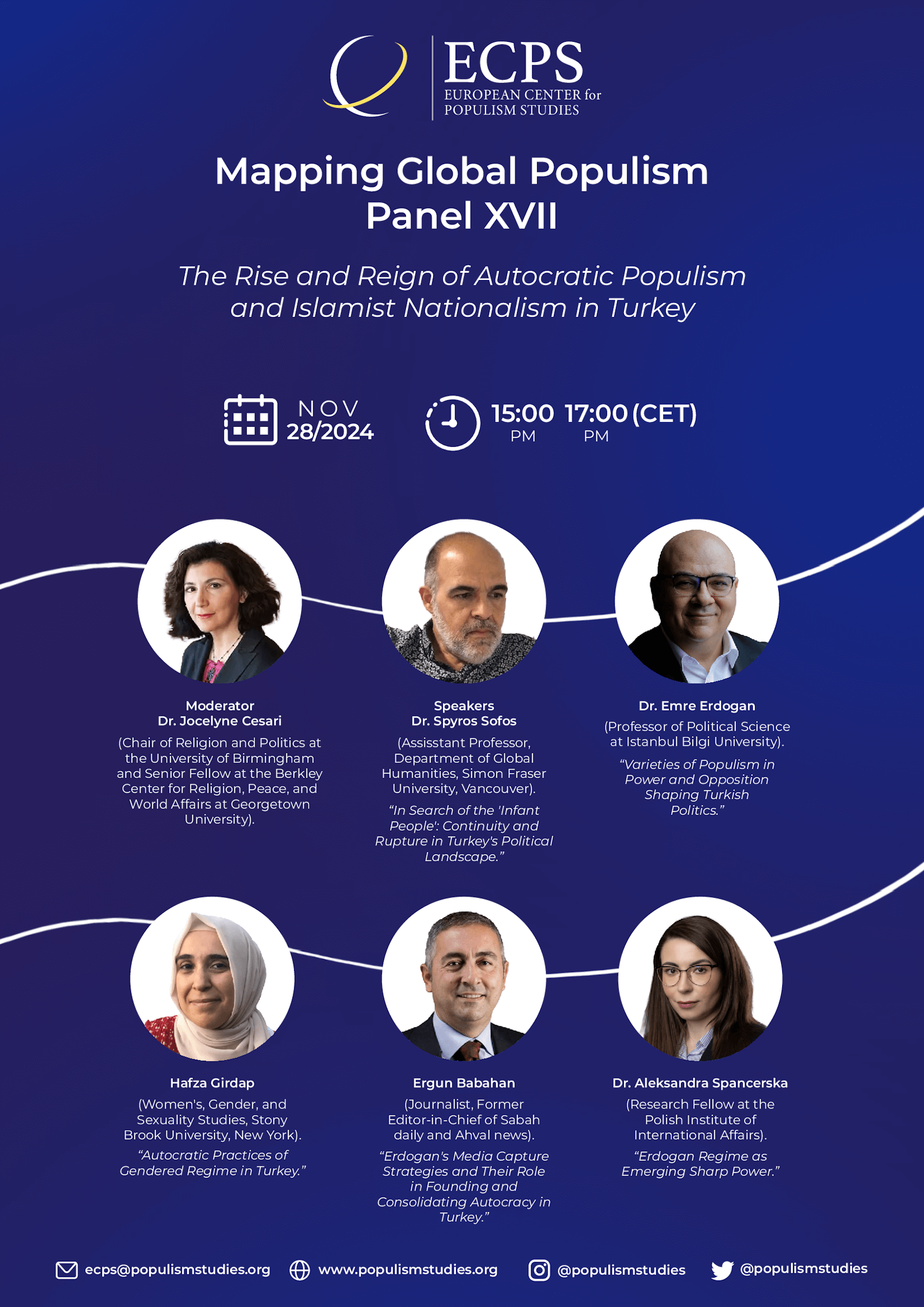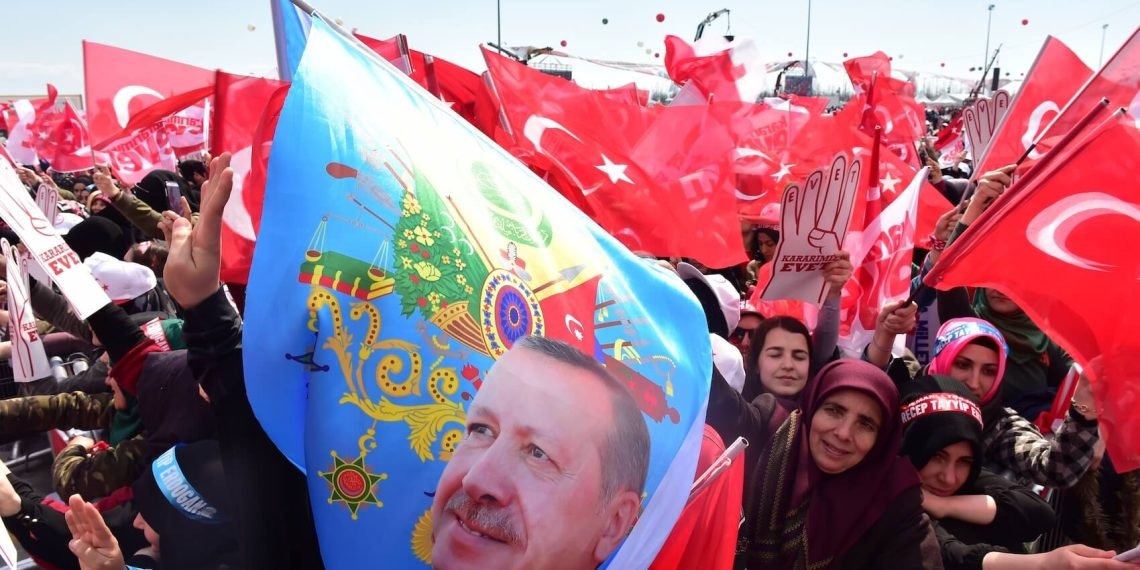Please cite as:
Stamoglou, Anastasia. (2024). The Rise and Reign of Autocratic Populism and Islamist Nationalism in Turkey. European Center for Populism Studies (ECPS). December 9, 2024. https://doi.org/10.55271/rp0090
On November 28, 2024, ECPS hosted the 17th session of the Mapping Global Populism Panel Series, titled “The Rise and Reign of Autocratic Populism and Islamist Nationalism in Turkey.” This session examined the transformative political strategies of Recep Tayyip Erdogan, exploring their impact on Turkey’s political and social fabric. A distinguished panel of experts discussed key topics, including the evolution of national identity, media manipulation, the gendered impacts of authoritarianism, and Turkey’s global influence through sharp power. The session offered critical insights, enriching the series’ mission to deepen understanding of populism’s global effects.
Report by Anastasia Stamoglou
The European Center for Populism Studies (ECPS) hosted the 17th session of the Mapping Global Populism (MGP) Panel Series, “The Rise and Reign of Autocratic Populism and Islamist Nationalism in Turkey,” on November 28, 2024. The session explored the intricacies of populism, authoritarianism, and nationalism in Turkey. Bringing together a distinguished panel of scholars and practitioners, it delved into the transformative political strategies of Recep Tayyip Erdogan’s leadership, with a particular focus on how these strategies have reshaped Turkey’s political and societal landscapes.
Moderated by Dr. Jocelyne Cesari, an authority on religion and politics, the panelists included Dr. Spyros Sofos, whose research examines Turkish populism through a historical lens; Dr. Emre Erdogan, an expert on political participation and populist dynamics in contemporary Turkey; Hafza Girdap, a gender studies researcher focusing on the intersection of political Islam and patriarchy; Ergun Babahan, a veteran journalist with deep insights into Turkey’s media landscape; and Dr. Aleksandra Spancerska, who analysed Turkey’s use of sharp power in international relations. Together, they provided a comprehensive and multi-disciplinary exploration of the challenges posed by autocratic populism in Turkey.
The discussion critically examined topics ranging from the evolution of national identity and the strategic use of media to the gendered impacts of authoritarianism and Turkey’s sharp power influence on the global stage. This session contributed significantly to the series’ goal of fostering a comprehensive understanding of populism‘s global impact.
Panel Overview
Dr. Jocelyne Cesari, Chair of Religion and Politics at the University of Birmingham (UK) and Senior Fellow at the Berkley Center for Religion, Peace, and World Affairs at Georgetown University opened the discussion by contextualizing Erdogan’s rise within the broader trends of political Islam and populist ideologies. She highlighted the fluid interplay between nationalism and religion in Erdogan’s narrative, tracing its evolution from a seemingly democratic framework to an increasingly authoritarian model. Dr. Cesari emphasized how Erdogan’s governance reflects a strategic adaptation of populist tools, balancing appeals to religious identity with nationalist pride, in a bid to consolidate power while managing internal and external challenges.
Speaker Contributions
Dr. Spyros Sofos, Assistant Professor at Department of Global Humanities at Simon Fraser University, Vancouver, Canada, initiated the panel with a presentation titled “In Search of the ‘Infant People’: Continuity and Rupture in Turkey’s Political Landscape.” His analysis centered on the historical construction of “the people” in Turkish political discourse, which he described as a dualistic symbol of innocence and incapacity. Dr. Sofos traced this metaphor’s roots back to Mustafa Kemal Ataturk’s republican reforms, where the populace was envisioned as a collective in need of guidance and reformation. This patronizing approach to the masses, Dr. Sofos argued, established a political tradition in which the people are alternately celebrated and marginalized. Moving to the contemporary era, he examined how Erdogan has repurposed this narrative, framing the people as both sovereign and subservient, a dichotomy legitimizing autocratic governance. Dr. Sofos underscored how this discourse has facilitated the exclusion of perceived “enemies” of the state while deepening divisions within Turkish society, situating Turkey’s case within a broader global pattern of populist authoritarianism.
Dr. Emre Erdogan, Professor of Political Science at Istanbul Bilgi University, followed with a detailed exploration of Turkey’s recent electoral cycles in his presentation, “Populism in Transition: Continuities and Shifts in Turkey’s Political Landscape (2023–2024).” He provided a nuanced analysis of the dynamics that shaped the 2023 presidential and 2024 local elections, highlighting the persistence of populist rhetoric rooted in nationalism and religious symbolism. His discussion revealed how the opposition adopted elements of populism to challenge Erdogan’s dominance, a strategy that produced mixed results. Dr. Erdogan examined how economic instability, natural disasters, and the migration crisis became pivotal themes in political campaigns, serving as both challenges and opportunities for populist actors. He argued that while Erdogan has maintained his core narratives, the rise of new actors and shifting voter behavior reflect a changing political landscape. The presentation offered valuable insights into the mechanisms through which populism continues to shape governance, polarization, and political alliances in Turkey.
Hafza Girdap from Women’s, Gender, and Sexuality Studies, Stony Brook University, New York brought a critical gendered perspective to the discussion with her presentation, “Autocratic Practices of the Gendered Regime in Turkey.”She dissected how the Justice and Development Party (AKP) has leveraged patriarchal and Islamist ideologies to consolidate power while systematically oppressing women and marginalized groups. Girdap traced the intersection of political Islam, nationalism, and patriarchy, demonstrating how these forces reinforce traditional gender roles and limit women’s participation in public life. Drawing on examples such as the withdrawal from the Istanbul Convention, Girdap highlighted the state’s failure to address gender-based violence and its role in perpetuating systemic inequalities. She also explored the compounded discrimination faced by Kurdish women, LGBTQ+ individuals, and other minorities, emphasizing the use of gender as a tool of social control. Her analysis provided a powerful account of how authoritarian regimes exploit gendered hierarchies to maintain power and suppress dissent.
The presentation of Ergun Babahan, a veteran journalist, Former Editor-in-Chief of Sabah daily and Ahval news, “Erdogan’s Media Capture Strategies and Their Role in Founding and Consolidating Autocracy in Turkey,” offered a deep dive into the strategic manipulation of Turkey’s media landscape under Erdogan. Babahan, drawing from his extensive experience as a journalist, described how Erdogan has systematically co-opted both state and private media to serve his autocratic agenda. He traced this trend back to Erdogan’s early political career, highlighting his strategic alliances with media proprietors and the use of state resources to undermine journalistic independence. Babahan argued that Erdogan’s media dominance now rivals the control exerted by military regimes in Turkey’s past, enabling the administration to shape public discourse and marginalize opposition voices. His discussion illuminated the broader implications of media suppression for democracy and public accountability, situating Turkey within a global context of declining press freedoms.
Dr. Aleksandra Spancerska, Research Fellow at the Polish Institute of International Affairs, concluded the panel with her presentation, “Erdogan Regime as Emerging Sharp Power.” She introduced the concept of sharp power to describe Turkey’s growing influence on the international stage, particularly through technology, censorship, and diaspora politics. Dr. Spancerska analyzed how Erdogan’s regime has leveraged these tools to suppress dissent both domestically and abroad while projecting power internationally. She examined the strategic use of digital platforms and surveillance technologies to monitor and control political dissidents, as well as the mobilization of the Turkish diaspora to extend Erdogan’s ideological reach. By positioning Turkey as a counterweight to Western liberalism, Erdogan has crafted a narrative that appeals to nationalist sentiments while justifying his autocratic practices. Dr. Spancerska’s presentation offered a critical perspective on the intersection of domestic authoritarianism and global power dynamics, underscoring the implications for international relations and democratic governance.
Conclusion
The 17th session of the Mapping Global Populism Panel Series provided a comprehensive examination of the mechanisms through which populism, Islamism, nationalism, and authoritarianism intersect in Turkey. Each speaker brought a unique perspective to the discussion, collectively painting a nuanced picture of how Erdogan’s leadership has transformed Turkey’s political, social, and international landscapes. The panel emphasized the broader implications of these trends for Turkey and the global struggle against populist authoritarianism.
Through its insightful analysis and interdisciplinary approach, the session reinforced ECPS’s commitment to fostering critical discourse on populism’s impact worldwide. The insights shared during the event will undoubtedly serve as a valuable resource for understanding the complexities of Turkey’s political trajectory and the challenges facing democratic governance in an era of rising authoritarianism.



